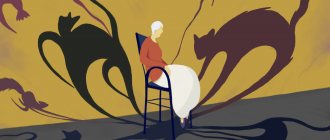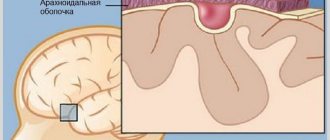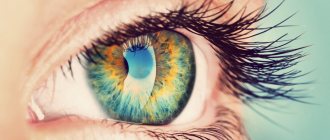The Internet is full of crazy people. You may come across such a character on any of the forums or in comments on social networks. He might not like your avatar or your thoughts, or even your grammatical errors. But there is a possibility that the same person who so masterfully sent you on an erotic journey on foot for thoughts that were incorrect from his point of view, in reality is not so aggressive, and, in general, is mother’s joy, father’s pride.
So what types of personality disorders manifest themselves in a person as soon as he gets on the Internet?
Intermittent explosive disorder multiplied by the Internet
Basically, this is a calm person who can joke sweetly and have light conversations on forums for weeks. But up to a certain point. Any little thing can make him angry, and this sweet man will begin to send everyone to distant distances, urging him on with a choice swear word. And cursing you, and your family and anyone passing by. And it would seem...
In real life, there are less than 10% of people prone to IER. They are clearly characterized by unstable mood. These people tend to explode over any, often insignificant, reason. To the point that the store didn’t give change for a ruble, and they made a scandal as if they weren’t given a thousand or even worse. People with this disorder are prone to uncontrollable aggression.
Fanatic Page Refresh Syndrome
Internet addiction manifests itself in different ways, but one of the main ones is precisely this: refreshing the page.
Whether it's a new post on social networks or a new photo, that's it. All subscribers and friends should intuitively feel when an F5 fan has posted something and immediately, abandoning everything else, go like, repost and write comments. Moreover, this delightful post should thunder on the Internet like no one has ever thundered before.
But now the post is posted and the wait for national recognition begins. The author methodically updates the page every three minutes. Having received at least some response, even in the form of a vague comment (and if the comment is not one word, then wow), the author becomes more active, diligently writes a very detailed answer and again freezes in anticipation.
But if such a wonderful post remains unnoticed by the public for more than five (!) minutes, then the author writes a second post about how everyone is a pig and how could you, where are the comments, who am I trying for, and the like.
In real life, such an effect causes a person’s desire to obtain psychological comfort by immediately satisfying his needs, through dependence. A good example of this behavior is a small child who wants a toy in a store and chooses a tantrum as the way to get it.
Munchausen on the Internet
Or a victim of circumstances. On any platform there is an Internet hero who, in general, behaves more than normally, most of the time, and then some tragedy happens in the life of this character. One of the relatives has died or the hero is terminally ill, and all the inhabitants of the resource throw their inner strength into expressing their sympathy for the author, into virtual rays of goodness and all kinds of support. But the bitterness of sadness subsided, several months passed, and then again. The hero’s hamster is terminally ill, or the apartment burned down, the bathhouse is flooded, in general, a universal disaster. Usually, by the fifth time, even the most compassionate inhabitants of the resource have no sympathy for such a character. Only newcomers react to it, calling oldfags heartless brutes.
In real life, people suffering from such a mental disorder imitate the symptoms or the disease itself in order to evoke sympathy from others. In general, the basis of this syndrome, like those described above, is the need for attention. The only difference is that in this case positive attention is needed, that is, sympathy and support.
Excitable and epileptoid psychopathy
1) Excitable (explosive) psychopathy (EP). It occurs mainly in boys. Its first signs are usually detected during the age crisis at the age of 2–4 years. Patients are overly excitable, often exhibit chaotic motor activity (“motor storm”), scream a lot, easily become embittered, and are capricious in the presence of strangers. Any prohibitions, and especially punishments, cause violent reactions of active protest in patients with malice, aggressiveness: they bite, scratch, spit, punch, etc. These reactions are short-lived and are usually accompanied by pronounced vegetative manifestations (facial hyperemia, dilated pupils, sweating , tachycardia, shortness of breath). Patients, in addition, are stubborn, negative, exhibit unstable mood, easily move from elated to dysthymic with whims and tears.
These response features slowly increase throughout preschool age. Patients are difficult in the family and in children's groups, where they constantly violate the regime, do not obey parents and teachers, beat children, easily become embittered, are capricious (scream loudly, fall to the floor, hit their heads and torsos), break toys, and spoil things.
At primary school age, affective outbursts occur less frequently and usually occur in response to offensive remarks or punishment. However, the range of protest reactions, both active and passive, is significantly expanding, and patients often seem to consciously act to spite others (pseudo-perverse behavior). Repeated departures from home, school, and childcare centers occur, and school discipline and academic performance suffer greatly. With adequate educational measures, it is possible to somewhat smooth out behavioral disorders or, in some cases, even overcome them (a level pedagogical approach, a strictly regulated regime with the absence of unoccupied time intervals, directing the increased need for motor and affective discharge in the right direction, for example, into physical labor, is recommended). sports).
The most pronounced and at the same time polymorphic behavioral disorders in EP are observed in the puberty period. At the same time, mood swings and accompanying optional disorders (demonstration, bravado, reactions of emancipation, active and passive protest, including suicidal behavior, imitation of antisocial forms of behavior, delinquency) come to the fore. Behind this external facade, obligate characterological traits are always revealed: pronounced affective excitability, a tendency to violent affective outbursts with aggression, impulsive behavior, the appearance of dysphoria under the influence of situational factors.
2) Epileptoid psychopathy (EP). It is more common in boys from families with epilepsy patients. It is often formed by the age of 12–13 years. EP has much in common with excitable psychopathy, at the same time it is characterized by specific features. With the latter in mind, two main types of EP are distinguished.
The first version of EP is characterized by a combination of excitability, a tendency to dysphoria and a pathological increase in drives, which usually results in dissocial behavior.
The second version of EP is distinguished by a combination of excitability with hypersociality and affective viscosity. The last two character traits are manifested by pedantry, exaggerated neatness and cleanliness, and excessive adherence to order. In addition, there is suspicion and a willingness to perceive unfair treatment towards oneself, a tendency to complain and slander, rancor, vindictiveness, a long-term persistence of a reaction to discomfort, which also seriously disrupts interpersonal relationships, and conflicts, in turn, cause psychopathic responses from others. patients.
The basis for the formation of EP, according to G.E. Sukhareva (1959), constitute abnormal temperament, the sphere of instincts and drives. Already in early childhood, a tense, lingering affect is detected, a predominance of a gloomy dissatisfied mood with irritability and capriciousness. Patients cannot tolerate even a slight feeling of hunger or thirst and react violently to any discomfort. From the age of 3–4 they demonstrate a sadistic desire to cause suffering to others, especially close people, and increasing egocentrism. Hypercompensatory reactions are revealed: dreams of bloody reprisals against their offenders, isolation, activities and entertainment alone, refusal to attend school, silence, which usually aggravates social and school exclusion. Signs of neuropathy are often detected: nervous low-grade fever, somatovegetative disorders, a tendency to affective-respiratory convulsions, sleep disturbances, appetite, weight loss. Inappropriate reactions to what is happening or reactions to an inadequate attitude towards oneself seem to accumulate, accumulate, and this is manifested by the gradual crystallization of psychopathic character traits.
A sharp deterioration is observed at puberty. Dysphoria becomes more frequent, desires intensify, and the range of pathocharacterological reactions expands. Some patients experience wandering and vagrancy, sexual excesses, and use of psychoactive substances. In constitutional psychopaths, the features of “correctness” or hypersociality come to the fore, which in a number of situations, especially in the family, turn into extreme egocentrism, despotism and cruelty. In addition, there is a low level of development of intellectual functions.
Subsequently, in favorable conditions, one or another degree of compensation for psychopathic traits and social adaptation is possible; in psychotraumatic situations, on the contrary, decompensation and social maladjustment.
Return to Contents
Grammar Nazi
Communication on forums or in personal correspondence does not imply strict adherence to the rules of the Russian language. In principle, no one is protected from typos, and adequate interlocutors react normally to them. But on the Internet you come across it - linguistic Nazism. When, for any typo, a grammar-nazi produces a kilometer-long text about how such treatment of your native language is unacceptable and how the earth bears you in general, you are illiterate people.
In reality, this syndrome is called obsessive-compulsive personality disorder. It consists in the fact that a person becomes fixated and presents impossible conditions for performing certain tasks. This syndrome has similarities with obsessive-compulsive disorder, but the cardinal difference is that in OCD, ritual performance is more important than, for example, perfect literacy.
All this manifests itself in a person only because the Internet creates the illusion of security. You can be rude or lie and no one, it seems, will ever know. But the secret, sooner or later, becomes clear.
Respect Anonymous and Anonymous will respect you.
Features of the manifestation of pathology at different age stages
Depending on age, pathology can manifest itself in different ways. Knowing these features, you can prevent its further development. In this regard, the importance of knowing the symptoms of pathology increases. With regard to sexual preference, the disorder can manifest itself in both women and men.
In childhood
The first symptoms of the pathology can appear at the age of two years. A small epileptoid can shed tears for hours; it is impossible to distract him from grief. Neither caresses nor shouts will calm him down. Children with this personality disorder are unable to tolerate a slight need for food or water. A slight thirst in a small epileptoid can cause violent hysteria, which is difficult to interrupt. In early childhood, such children show sadistic tendencies - they torture animals, beat younger ones (bite, scratch), and mock the weak. In a group of peers, they strive not just for leadership, they need absolute power.
Epileptoids are distinguished by amazing thrift for all personal belongings and toys. Any encroachment on them can cause a sharp negative reaction. Primary school students are distinguished by their meticulousness and accuracy. For them, the educational process itself is not as important as maintaining order in student supplies.
During adolescence
At this age stage, the symptoms of epileptoid psychopathy appear more pronounced. The most striking manifestation of the disorder in adolescents is dysphoria. In this state, epileptoids are especially angry and irritable. A bad mood is combined with apathy, aimless sitting, and idleness. In their search for relief from this condition, epileptoid teenagers themselves provoke a scandal, which is accompanied by angry statements and emotions.
The epileptoid type in adolescence shows indifference to the opponent’s helplessness and unbridled rage. Uncontrolled attacks of anger can be directed at a potentially powerful opponent. In this state, they are capable of beating anyone; attacks of aggression are accompanied by cynical abuse.
Pathology also affects sexual desire. The increased interest in the intimate side of life in an epileptoid is restrained by the fear of contracting sexually transmitted diseases. Relationships with the opposite sex are always accompanied by jealousy. In case of betrayal, epileptoids are not able to forgive. They consider even insignificant flirting to be betrayal.
In moments of dysphoria, they torment the object of their love with their jealousy, even without any reason. At this age, the epileptoid type demonstrates an interest in hoarding. He is attracted to collecting things that can be resold at a profit. The desire to get rich remains with the epileptoid throughout his life.
In sexual relations, the epileptoid type can adhere to either sadistic or masochistic tendencies. As for alcohol, they are attracted to strong drinks. When drinking alcohol, they drink until they pass out completely. This explains the development of alcohol dependence in epileptoid men, although this disease is also common among the fair sex. They are characterized by conflicts with their parents. Often, frequent quarrels in the family of an epileptoid become the reasons for the breakdown of relations with relatives. After this, he begins to commit various acts to spite his loved ones.










